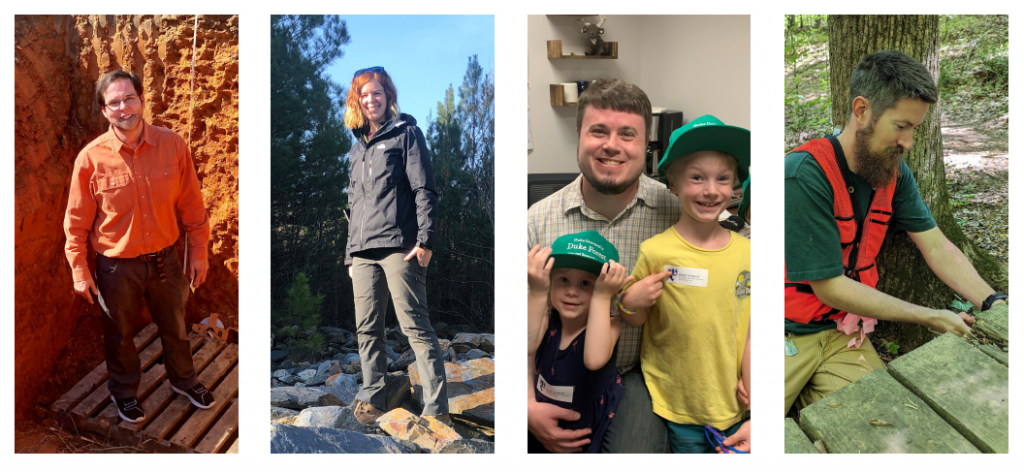Expanding the Team to Meet the Moment
In the first half of 2023, our office is reflecting on some of the major accomplishments coming out of our 2017-2022 5-Year Strategic Plan. This plan has been a pivotal one for the Forest. As we move to advance these goals and accomplishments into our next strategic plan, we thought to share some of our highlights with you.
Goal 1. Research and Teaching
Action E.2. Expand staff capacity and explore opportunities to better align Duke Forest’s natural, financial, and human resources to accomplish strategic goals.
We’re wrapping up our series highlighting some of the many successes of our 5-year strategic plan with one of the most exciting and most obvious ones—the expansion of our team. As many of you saw in our Duke Origins | Duke Forest film last year, it is the people of our dedicated team that make the Forest the beloved teaching and research asset it is. As Duke’s Centennial Celebration next year will certainly remind us, the Forest’s story is long, fascinating, and and made up of a succession of interesting characters before us who left their mark in our work. And we are making our unique mark too in this living legacy.
From the first Director Clarence Korstian’s planting of mostly abandoned fields in managed pine to grow under the watchful eyes of the South’s first graduate school of Forestry in the 1930s to the work of our current office for the world-renowned teaching and research laboratory we know today, the land base’s health and history has been entrusted to each successive generation of staff. Recently, we have been in the process of yet another succession. Since our 2017 strategic plan went in place, we’ve gained four new members of our team while saying farewell to two others.

- In 2018, now Assistant Director of Engagement Blake Tedder, was brought on board as Communications and Engagement Coordinator to begin the Forest’s first communications program and also its first fundraising program. While the Forest has always been reliant on revenues from timber harvesting, Blake’s position aims to make it less so while engaging our community to join us in supporting the mission.
- In 2021, we bid farewell to Assistant Director Jenna Schreiber, but we gained another influential member on the team. Maggie Heraty, now Senior Program Coordinator, joined as our Program Coordinator to take leadership of our largest volunteer programs—Herpetofauna of the Duke Forest Community Science and the Forest Stewards program (the latter she built from scratch). Multitalented, Maggie also oversees the deer management program, among many other initiatives.
- Just this year, after the retirement of long-time Administrative Assistant Beverly Burgess, Timothy Barco came aboard as our Operations Coordinator to manage finances, databases, office administration, and shelter rentals. Tim will also provide capacity in programmatic support and will find many ways to lead as a crucial member at the center of our team.
- Also this year, Zach Carnegie moved down from Maryland to become our Forestry Technician, a new position that will add critical capacity and additional forestry expertise to our field team. We have more muscle and problem-solving power than ever before.
Under the leadership of Executive Director Sara Childs, and support from university administration, our entire team including Forest Supervisor Tom Craven and Maintenance and Infrastructure Manager Craig Hughes along with seasonal interns and student assistants, are collectively looking to the future. We are working alongside the Forest as emerging big questions are calling us to meet the moment. We addressed some of these questions on the front page of last year’s Duke Forest LOG:
- How will increasing local and global pressures — from urbanization to climate change — continue to drive change in the Duke Forest and to the benefits it provides?
- Should we try to manage some of that change, adapt to it, or both?
- What should we do with long-term research sites as the research community itself transitions and evolves?
These are just some of the big questions we are wrangling with. As we have shared for years, the Duke Forest is “more than just the woods”. It is a storied land base that is helping us understand what is happening to our world. It is more vital than ever to have places like the Duke Forest set apart for inquiry and demonstration. For innovation and discovery. While large questions may loom, the irreplaceable Duke Forest is entrusted to our staff, and we are resolute in our work on its behalf.






